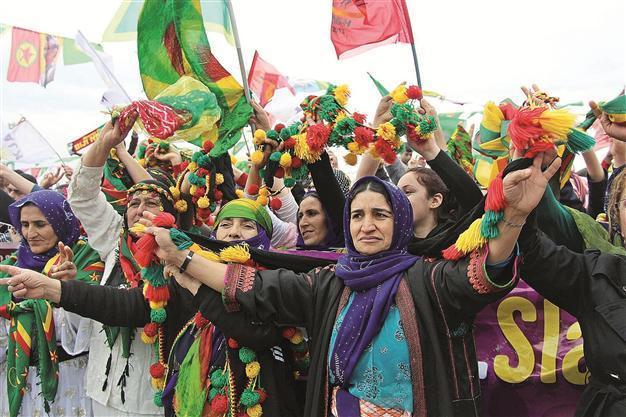Eyes on Diyarbakır for PKK leader Öcalan’s key Kurdish bid message
Okan Konuralp DİYARBAKIR

DHA Photo
All eyes will be on Diyarbakır on March 21, where a letter from the jailed leader of the outlawed Kurdistan Workers’ Party (PKK), Abdullah Öcalan, will be read during Nevruz festivities, marking the arrival of spring.In the letter, seen as a crucial step in the ongoing Kurdish peace process to find a solution to the decades-old problem that has claimed tens of thousands of lives, Öcalan is expected to express the conditions for the PKK to call a congress and end the armed struggle against Turkey, instead of a direct call to lay down arms.
The two-page letter will be read in Turkish by Peoples’ Democratic Party (HDP) lawmaker Sırrı Süreyya Önder and in Kurdish by HDP Deputy Parliamentary Group Chair Pervin Buldan, who are both members of the delegation meeting Öcalan and government officials.
In his messages, Öcalan will emphasize “the importance of continuing the reinforced ceasefire between the security forces and the PKK,” call for an end to the violent street protests in Turkey’s southeast, and tell the PKK to “strengthen its ties with the parts of Kurdistan outside Turkish soil.”
It will be the third public letter from Öcalan since the official launch of the Kurdish peace process in early 2013. In his first letter read during the Nevruz celebrations in 2013, the jailed PKK leader had declared that “the period of armed struggle is ending, and the door is opening to democratic politics,” adding that the PKK had “now arrived at the stage of withdrawing our armed forces outside the borders.”
There has not been a major armed clash between Turkey’s security forces and PKK militants since the 2013 declaration. However, the government has harshly criticized the PKK for not fully retreating its militants while the PKK argues that the government has not taken the necessary legal action before further steps.
Meanwhile, President Recep Tayyip Erdoğan’s criticism of the monitoring panel debate has led to further confusion over the peace process.
Öcalan and state officials had stated that they agreed to include names approved by both sides in the panel. According to the plan, the monitoring panel would start working after receiving the government’s approval, joining the HDP delegation in its first visit to Öcalan after Nevruz to start the “negotiation stage” of the process. But these plans may be revised after Erdoğan’s remarks.
The preparations for the celebrations, meanwhile, continued on March 20 in Diyarbakır’s Nevruz Square, where hundreds of thousands of people are expected to attend the festivities. Many posters for the event featured pictures of 12-year-old Nihat Kazanhan, who was killed by police fire in the southeastern town of Cizre on Jan. 14. People’s Protection Units (YPG) members killed in clashes with the Islamic State of Iraq and the Levant (ISIL) in Syria have also been put up at the square.
Representatives from 24 embassies in Turkey will be in Diyarbakır to attend the festivities and hear Öcalan’s messages.
More than 1,000 reporters, 200 of whom are foreign, have been accredited to follow the event.
Hotels in the city have been fully booked for weeks, while thousands of people from the surrounding cities are expected to travel to Diyarbakır on the day.
















